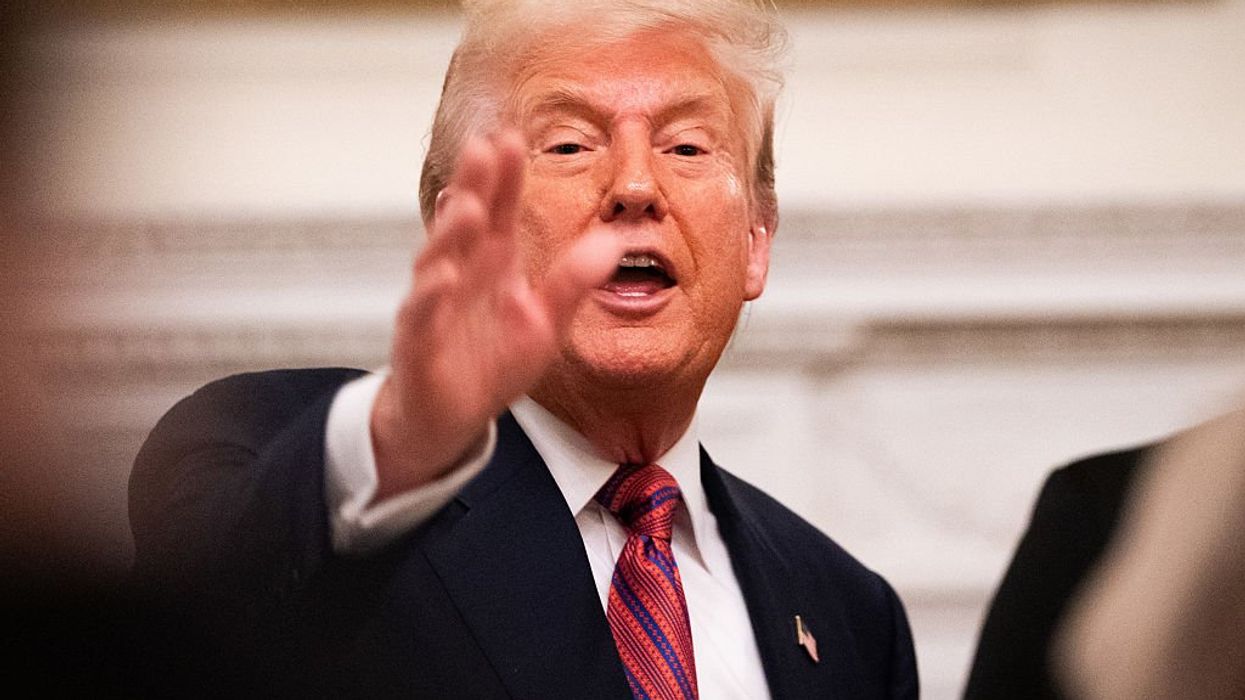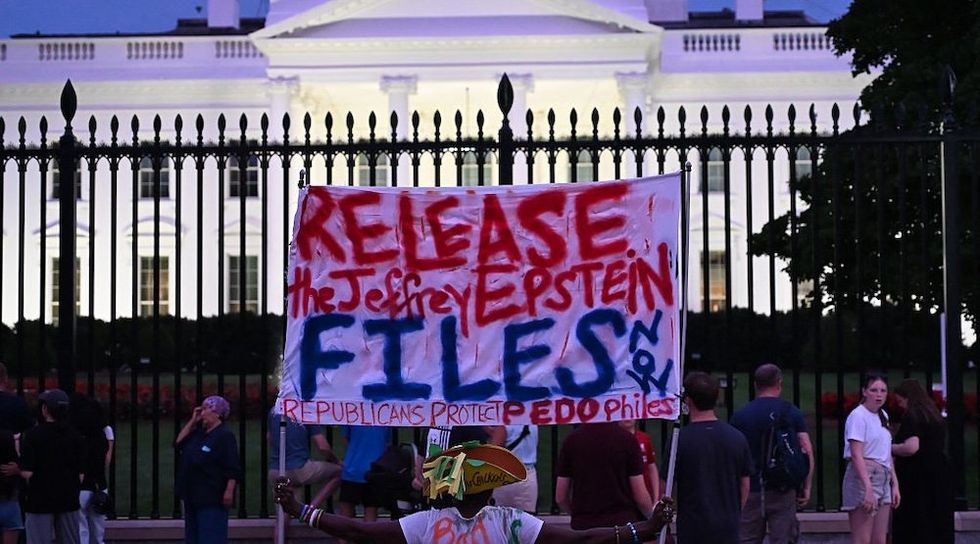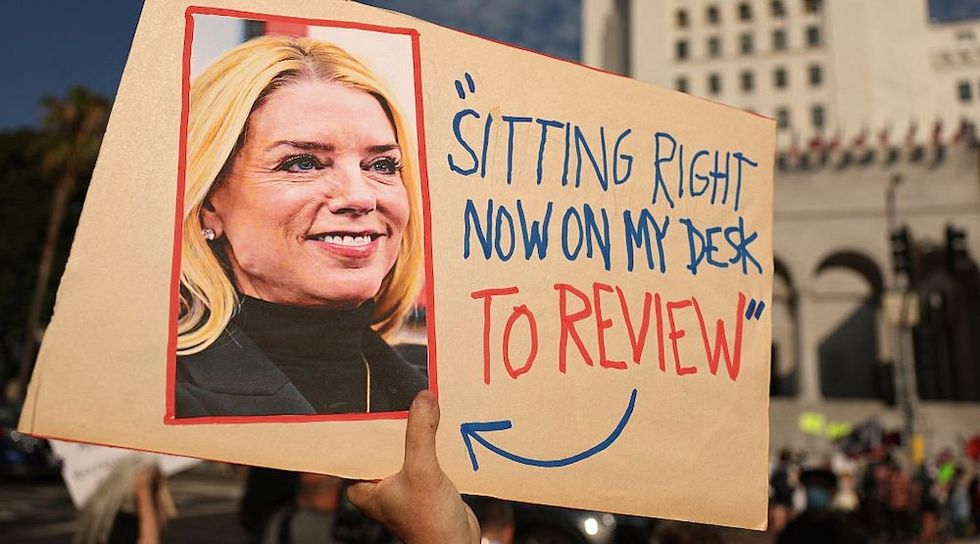
Photo by Allison Robbert/for the Washington Post via Getty Images

Jeffrey Epstein’s operation didn’t end with his death — because the structure that protected him is still in place and still calling the shots.
Why does the story of Jeffrey Epstein matter so deeply to the American right? Why does it persist, years after his death, as a source of outrage, fascination, and dread? Why is the call to “move on” met with such visceral resistance?
The answer lies in what Epstein’s case reveals. It is not merely the record of one man’s depravity or even the scale of the crimes committed. It is a window into a concealed architecture of unaccountable power, intelligence protection, institutional rot, and elite impunity. For many on the right, it confirms long-standing fears about how power in the United States is really organized and who it is designed to serve.
These questions strike at the heart of an older conservative concern: Who governs? And who is permitted to ask?
These concerns are hardly new. They are the very ones that helped elect Donald Trump, and they have shaped conservative criticism of the American regime since the New Deal. The Epstein affair provides a rare glimpse into the soft underbelly of the administrative state. At some point, moral clarity demands that we stop parsing and start acting. This is a time to strike, to “fire for effect.”
From the expansion of the federal bureaucracy under Franklin D. Roosevelt to the postwar rise of the national security state, conservatives have warned about the merger of government power with private influence. The most dangerous feature of that merger is not the bureaucracy itself, but the consolidation of authority among entrenched intelligence services, elite financial networks, and foreign-aligned interests. These actors operate in close coordination, beyond democratic oversight, and with the consistent protection of institutional power.
Epstein is valuable because he exposes that structure in plain sight. He had no obvious source of legitimate wealth. His hedge fund, insofar as it existed, had only one known client. Yet, he moved in elite circles, befriended presidents and princes, and maintained access to corporate titans and scientific institutions.
Most disturbingly, Epstein appears to have operated a long-standing sexual blackmail network. The question is not merely how he got away with it, but who allowed him to do so.
The answers are deeply unsettling. The FBI curtailed its investigations. The CIA has remained silent. The media showed little interest and declined to pursue the story in any depth. Meanwhile, the possible involvement of foreign intelligence services (especially those operating through figures like Leslie Wexner) has been treated as politically untouchable. This refusal to investigate is not born of ignorance or oversight. It is protective behavior. It signals that the wrong people are implicated.
Even if one adopts the minimalist position, that Epstein was not a formal intelligence asset, the implications remain staggering. Why would a known predator be permitted to operate so openly, with so many connections to power? Is the American state unable or unwilling to act when the guilty hold the right kinds of passports or relationships? Have we reached a point where elite networks are simply beyond reach, shielded by layers of shared interest and mutual compromise?
These questions strike at the heart of an older conservative concern: Who governs? And who is permitted to ask?
RELATED: The White House will need to do plenty more to get past Epstein

Epstein’s case offers a rare and ugly answer. What it uncovers is not a fever dream of conspiracy but an observable mode of governance that relies on secrecy, compromise, and shared immunity. It appears that intelligence actors have conducted operations not only abroad but also inside the United States, targeting the American elite itself. An immoral country condones sexual blackmail as a mechanism of influence and protection, integrated into a broader system of control ... ironically an indication of a country spinning out of control.
One can find instructive parallels in the operations of Israeli intelligence during the 1980s and 1990s. Under the direction of Mossad officials such as Efraim Halevy, Israel conducted systematic surveillance and developed personal leverage over Syrian elites. These methods included financial inducements, covert recordings, and exposure of private behavior. Such tactics are common in international espionage and are recognized tools of statecraft.
What makes Epstein so alarming is the apparent use of similar techniques within the United States, directed inward rather than outward. The uncomfortable possibility is that foreign intelligence services (including Israeli cutouts operating through figures like Wexner) were not merely bystanders, but active participants or beneficiaries of the Epstein operation. That possibility remains largely uninvestigated, not because it lacks merit, but because it threatens established political alignments.
Wexner’s history as a major donor to Republican candidates is one example of how these relationships complicate any honest inquiry. For a sitting senator or rising intelligence officer, confronting these questions comes at great cost.
This story is not important only because of the criminal sexual behavior it contains. That abuse, particularly of underage girls, is monstrous and demands full exposure and justice. But Epstein’s operation mattered at a higher level because those crimes were used to build networks of control. They were not incidental. They were instrumental. This is the cold logic of espionage deployed inside a supposedly self-governing republic.
RELATED: The conspiracy theorist is the last honest man

For the political right, Epstein represents a grim vindication. The warnings about politicized intelligence services, compromised elites, and foreign impunity were long dismissed as paranoia or fringe thinking. Yet, the details of this case suggest those warnings were not only plausible, but understated.
Consider the unequal application of the Foreign Agents Registration Act. Consider the way domestic allies are hounded while foreign-aligned actors operate with impunity. Consider the cultural message that those with the right credentials and connections will never face consequences. Epstein’s story reveals the inner wiring of a regime that no longer pretends to serve the citizen, only itself.
Was Epstein a direct employee of a domestic or foreign intelligence apparatus? I highly doubt it. My best guess is he was a very well-connected money launderer with a psychopathic lack of empathy who was therefore the perfect tool for intelligence gathering and manipulation. He operated in the open, however, and was criminally harmful to some of the most vulnerable U.S. citizens. But we have seen how little citizenship means in the modern internationalist cosmopolitan soup.
Efforts to bury this story are morally callous and institutionally suicidal. Each attempt to suppress, ignore, or discredit the legitimate questions raised by the Epstein case erodes the remaining credibility of the agencies involved. The denial becomes confirmation. The silence becomes testimony. The cover-up increases the criminality, the offense to the American people.
President Dwight D. Eisenhower (R) warned in his farewell address of a rising military-industrial complex. But the deeper danger he identified was the fusion of state power, private capital, and unaccountable influence. Epstein should be understood as a grotesque product of that fusion. Refusing to confront it will not preserve institutional authority. It will ensure its collapse.
In the end, the Epstein story is not simply salacious. It is foundational. It forces a reckoning with how the American regime truly operates and what moral and political compromises have become routine. That is why so many are eager to see it buried.
And that is precisely why it must not be.
Ronald Dodson